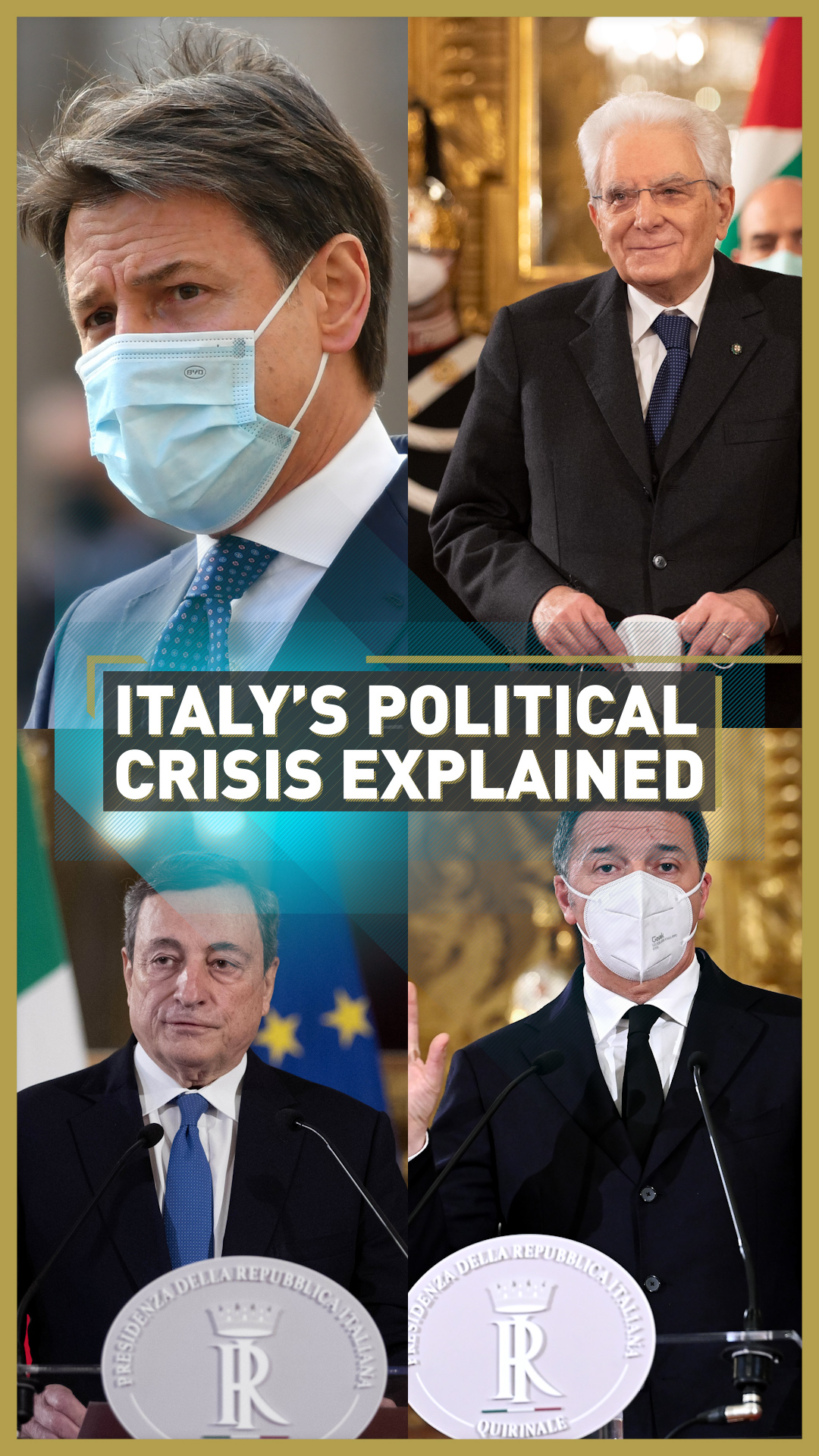02:51

Former president of the European Central Bank (ECB) Mario Draghi has secured the conditional support of Italy's two biggest parties to form a new government of national unity which will lead the country out of the current political crisis.
A new round of talks and negotiations will start on Monday and proceed during the rest of the week, when Draghi will disclose his policy proposals, which both the anti-establishment Five-Star Movement and right-wing League have said will be key to confirming their support.
Draghi is also expected to unveil his projected cabinet make-up and a broad policy agenda, as well as establishing the details of the coalition that will back up his government.
Draghi, a 73-year-old economist, was appointed by Italy's President Sergio Mattarella to form a national unity government after the resignation of former premier Giuseppe Conte.
Conte was forced to resign last month after former prime minister Matteo Renzi pulled his Italia Viva party out of the coalition government over the spending of the European Union's recovery fund.

Italy's President Sergio Mattarella, left, shaking hands with Mario Draghi back in October 2019. Now Mattarella has asked Draghi to end their country's political deadlock. /Boris Roessler/Pool Photo via AP
Italy's President Sergio Mattarella, left, shaking hands with Mario Draghi back in October 2019. Now Mattarella has asked Draghi to end their country's political deadlock. /Boris Roessler/Pool Photo via AP
Cecilia Emma Sottilotta, Assistant Professor of International Relations and Global Politics at the American University of Rome, tells CGTN Europe that Draghi represents Italy's main hope of finding political unity and stability amid uncertainty over the pandemic and its effect on the economy.
"The situation was critical because Italy has been hit very hard by the pandemic, both in terms of health and consequences on [the] public health [sector] and in terms of economic impact," she explains.
"Therefore, the last few weeks have been very, very complicated. Now there seems to be a way out."

Giuseppe Conte was forced to resign after two rounds of talks failed to seal an agreement among parties for a new premiership under his lead. /Mauro Scrobogna/LaPresse via AP
Giuseppe Conte was forced to resign after two rounds of talks failed to seal an agreement among parties for a new premiership under his lead. /Mauro Scrobogna/LaPresse via AP
"The President of the Republic, Mattarella, essentially decided to try and give this mandate to Mario Draghi to try and form a new coalition, when he realized that the current political parties were essentially squabbling – that they were not able to find a solution and form a new government," says Sottilotta.
Draghi is very well-respected in his home country, where he's seen by many as the only man capable of rescuing Italy from the current political crisis, the pressure caused by the pandemic and the looming economic disaster.
Italy hopes that 'Super Mario' will be able to do for the country what he did for the euro in 2012, when he pledged to do "whatever it takes" to save the EU's single currency from the worst financial crisis in its history.

The League's Matteo Salvini speaks to the media after meeting Draghi on February 6. /Roberto Monaldo/LaPresse via AP
The League's Matteo Salvini speaks to the media after meeting Draghi on February 6. /Roberto Monaldo/LaPresse via AP
"If you look at the Italian media right now, there is a process of glorification," says Sottilotta. "Draghi has been presented as a deus ex machina, like a God, like someone who's come to rescue the country, a savior."
But while pro-European forces in Italy, as well as the international financial markets, immediately welcomed the appointment of Draghi, others – especially the Five-Star Movement and League – weren't initially so enthusiastic.
"Part of the public opinion, especially affiliated or close to the Five-Star Movement, is actually very critical of Draghi," explains Sottilotta. "They say he's a technocrat who really embodies, if you think about it, the establishment – the former chief of the ECB."

Supporters hold placards reading "Draghi President" in front of the Quirinale Presidential palace in Rome on February 3. /Mauro Scrobogna /LaPresse via AP
Supporters hold placards reading "Draghi President" in front of the Quirinale Presidential palace in Rome on February 3. /Mauro Scrobogna /LaPresse via AP
Draghi has never endorsed any Italian political party, but as a former Bank of Italy governor and former director of the Italian Treasury, he's not only a seasoned economist, but one accustomed to the political environment.
Both Five-Star Movement and League changed their initial stances, which ruled out backing Draghi, joining almost all other parties in parliament now willing to support a national unity government.
But whether all parties across the Italian political spectrum will agree to be part of a broad coalition government remains to be seen.
Source(s): Reuters

